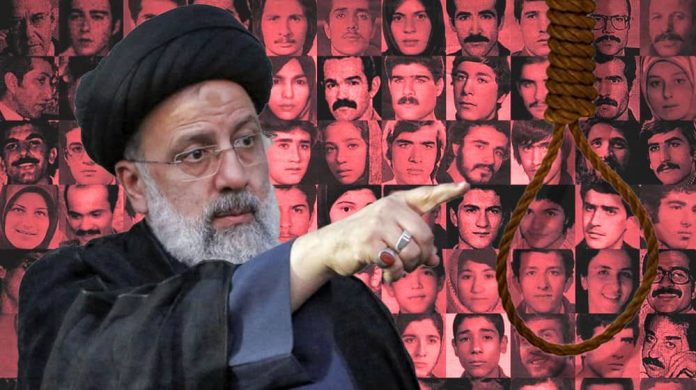Ebrahim Raisi: Iran’s Mass Murderer Addressing the UNGA

iran-ebrahim-raisi-1988-massacre-min
Written by
Mohammad Sadat Khansari
Ebrahim Raisi, commonly known as the “Butcher of Tehran,” is set to address the United Nations General Assembly, a move that has raised significant controversy and condemnation worldwide. Raisi’s dark past, marked by his involvement in heinous crimes and human rights abuses, should not be allowed to address the international forums. Instead of being allowed to stand before the UNSC, Raisi should be held accountable for his crimes, which include his role in the 1988 massacre of over 30,000 political prisoners in Iran.
One of the most horrifying chapters in Raisi’s history is his involvement in the 1988 massacre of political prisoners in Iran. In that summer, following a fatwa issued by Ayatollah Ruhollah Khomeini, over 30,000 political prisoners, mainly members and supporters of the People’s Mojahedin Organization of Iran (PMOI/MEK), were executed in various Iranian prisons. Raisi, who was serving as Tehran’s Deputy Prosecutor at the time, played a crucial role in this gruesome episode.
Raisi was a member of Tehran’s “Death Commission,” which oversaw the 1988 massacre. These commissions were authorized by Khomeini to execute political prisoners who remained steadfast in their positions. It was a blatant violation of human rights, and even Khomeini’s successor, Grand Ayatollah Hossein-Ali Montazeri, publicly condemned the actions of Raisi and the Death Committee, stating, “The greatest crime committed under the Islamic Republic, for which history will condemn us, has been committed by you. Your (names) will in the future be etched in the annals of history as criminals.”
After the 1988 massacre, Raisi’s ruthless nature gained Khomeini’s trust and propelled him into top positions within the Iranian regime. He was involved in various judicial roles, including Investigator in Masjed Soleiman Prosecutor’s Office, Prosecutor in Karaj Prosecutor’s Office, Karaj Prosecutor, Hamadan Prosecutor, Deputy Prosecutor General of the Tehran Revolutionary Court, and Revolutionary Prosecutor of Tehran. His ascent to power was deeply intertwined with his involvement in the regime’s crimes against humanity.
Raisi’s brutality extended beyond his actions in the 1988 massacre. In a speech at the 23rd National Assembly of Revolutionary Guards (IRGC) Commanders and Officials in 2019, he openly embraced his cruel nature, stating, “We will not cut the fingers of those who are corrupt; we will cut off their entire hand.” Such rhetoric underscores his willingness to use extreme violence to suppress dissent and maintain the regime’s grip on power.
On June 6, 2018, Ali Khamenei appointed Ebrahim Raisi as the head of Iran’s judiciary. Raisi’s role in the 1988 massacre of political prisoners played a pivotal role in his elevation to this position, especially in the aftermath of a nationwide uprising at the beginning of 2018.
A mass murderer at the U.N. General Assembly. Ebrahim Raisi, one of the perpetrators of the 1988 massacre of 30,000 political prisoners in #Iran, will address the UNGA on September 19. Raisi should not be allowed to address the U.N. General Assembly #ProsecuteRaisiNOW #UNGA pic.twitter.com/E6jl5HsRWg
— NCRI-FAC (@iran_policy) September 18, 2023
The January 2018 uprising, which culminated in the death of numerous activists and the incarceration of thousands, set the stage for Raisi’s ascension to power within the judicial system. This wave of protests was met with extreme violence in November 2019 when the Islamic Revolutionary Guard Corps and other repressive authorities responded with lethal force almost immediately after the demonstrations began. Tragically, in a matter of days, over 1,500 protesters were massacred in the streets and in the prisons, and thousands were once again arrested and subjected to Raisi’s judicial oversight.
Subsequently, Raisi’s trajectory led him to become the President of the Iranian regime, largely due to his harsh measures against regime opponents. In 2022, during another wave of uprisings, the regime’s suppressive forces were responsible for the deaths of more than 700 protesters, with over 30,000 individuals being arrested and subjected to torture.
The imperative for an international investigation becomes evident in light of these egregious human rights violations. Such an inquiry could pave the way for Ebrahim Raisi’s prosecution at the International Criminal Court, delivering long-awaited justice to the victims. The absence of such an investigation and subsequent prosecution would embolden Raisi and the entire Iranian regime, allowing them to operate with a dangerous sense of impunity. This poses a grave threat to the Iranian people and significantly diminishes the prospects of holding accountable those responsible for one of the worst crimes against humanity since World War II.
It is imperative that Western policymakers do not grant legitimacy to the Iranian regime’s brutal crimes on the international stage by providing platforms to a mass murderer like Ebrahim Raisi. Instead, they must act swiftly to investigate the 1988 massacre and hold Raisi accountable for his role in these atrocities. Failure to do so would represent a betrayal of fundamental principles and a grave injustice to the victims and survivors of the 1988 massacre. The international community has a moral obligation to heed the cries for justice and ensure that those responsible for these heinous crimes face the consequences of their actions

